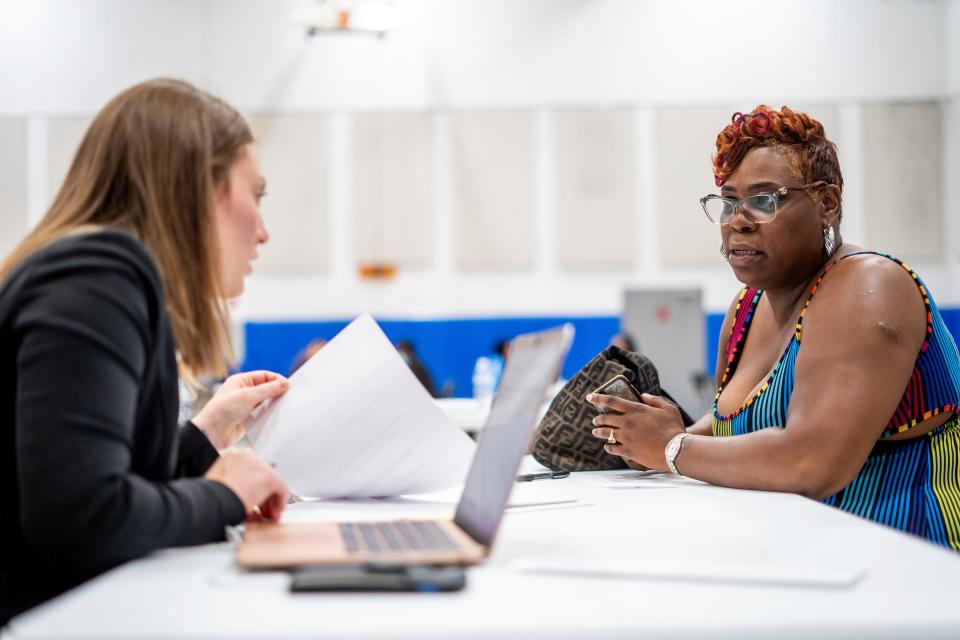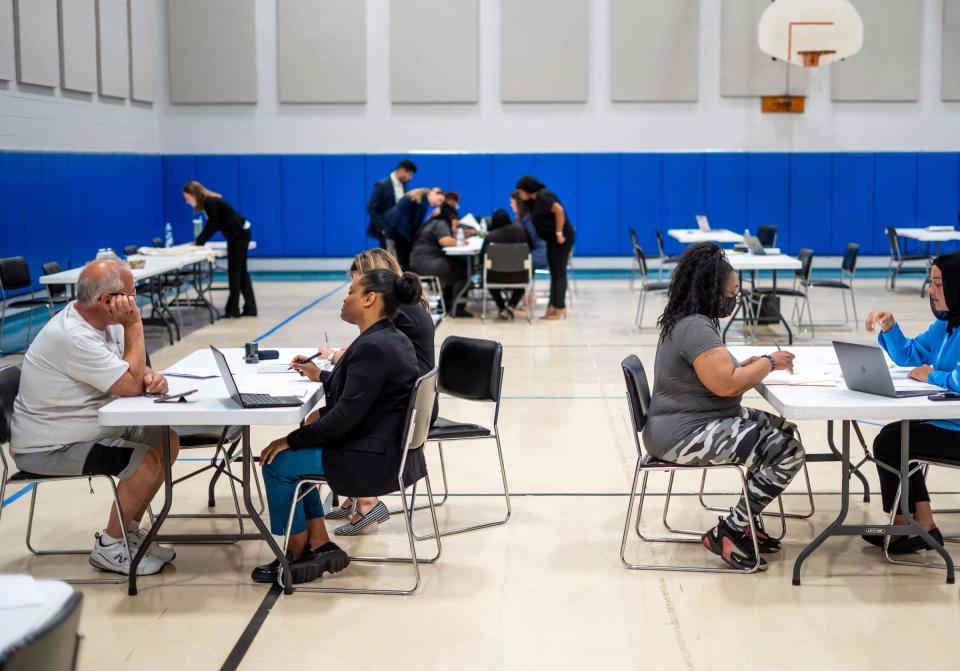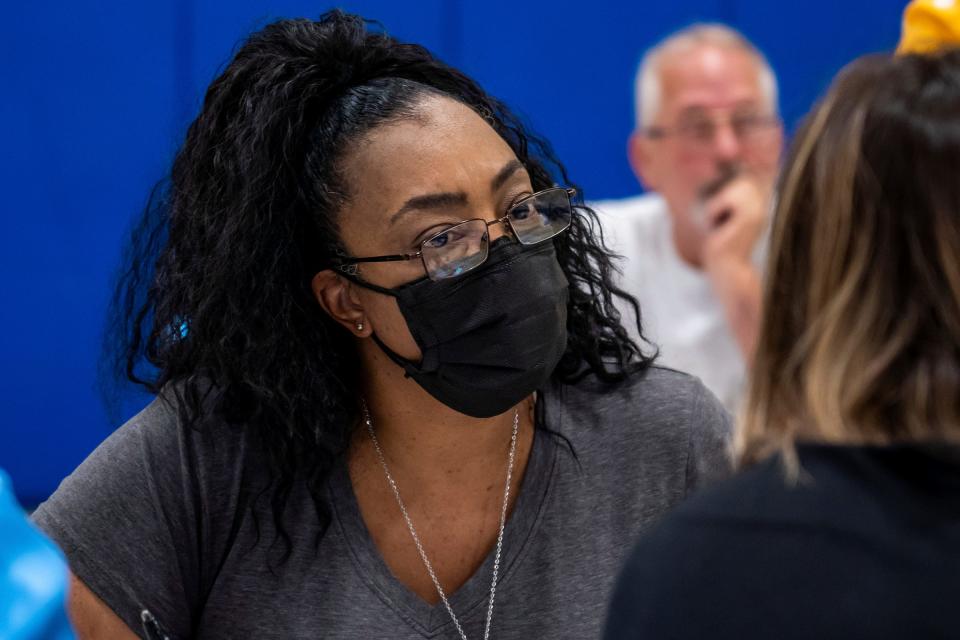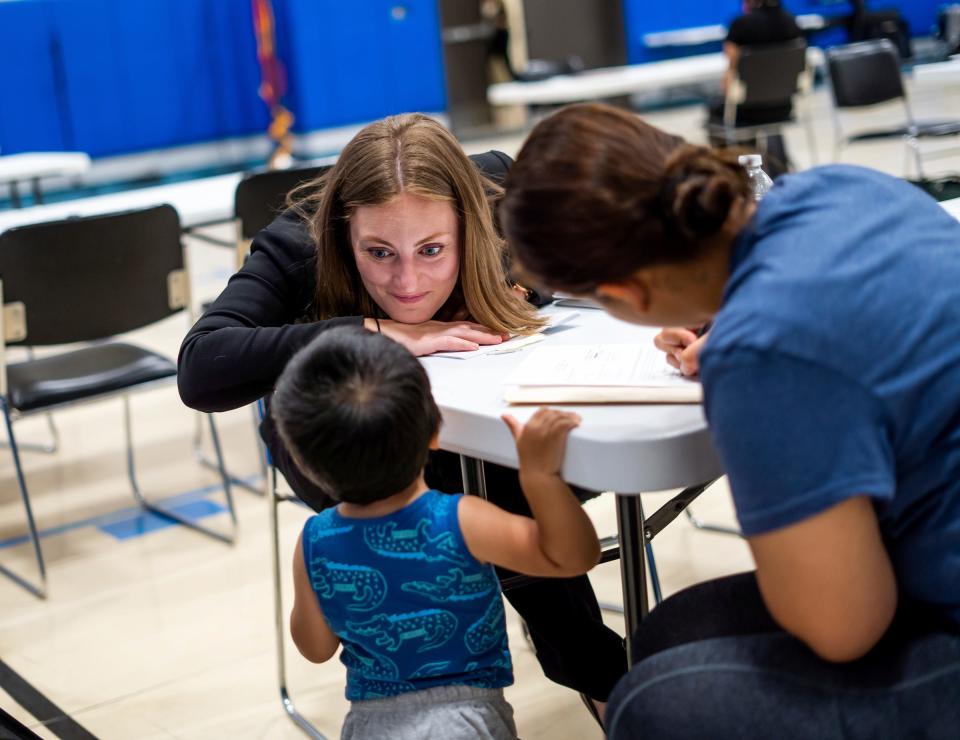'Rationing justice': Legal aid programs struggle to meet high demand
Kelisha Williams has been trying to get a divorce for five years and said it has been a long and expensive endeavor.
Last fall, when a car accident left her unable to work and without steady income, she couldn't afford a lawyer.
The cost for legal representation, according to estimates Williams received: between $8,000 to $10,000. But earlier this year, a 3rd Circuit Court judge referred her to the William Booth Legal Aid Clinic — the Salvation Army's only free legal service provider in the world, serving low-income metro Detroit residents — and she’s now hopeful she’ll get to a resolution. The 47-year-old Detroiter said it was a relief the court told her about the clinic because otherwise she likely would have been waiting for someone to call her back or tell her they're not accepting clients.
“It wasn't hard finding them. It was just hard to get someone to help you,” Williams told the Free Press on a Thursday in June as she waited at the clinic for help on default paperwork to proceed with the divorce. It was the first day the organization opened its in-person clinic after three years of over-the-phone and virtual services throughout the COVID-19 pandemic.

The phone at the William Booth Legal Aid Clinic constantly rings, clinic director Amy Roemer said. The nonprofit has to turn people away when it is booked with clients. It's a similar story at other legal aid organizations across the state. More than 1.7 million low-income Michiganders qualify for civil legal aid, however there is only one available attorney for every 5,401 eligible residents, according to the Michigan State Bar Foundation. Legal aid groups say the demand for free housing, family and consumer finance services far outweighs the available funding.
"We've never been funded at a level to really provide services. We are always rationing justice, which is terrible when you really think of that, but that's what we're doing,” said Ann Routt, executive director of the Michigan Advocacy Program, a free civil legal aid program covering 13 counties, including Washtenaw, Monroe and Lenawee counties.
Access to legal help is crucial, Routt said.
“Because underlying each individual's case is sort of their life story," she said. "Their housing case has implications for their ability to maintain their job. If they can't keep their housing, they could lose their job. If they lose their job, it can cause family issues. It's all so interrelated."
More: Ann Arbor wants to provide $525 a month to 100 entrepreneurs
More: 'Dehumanizing experience': What new operators of homeless hotline hope to fix
Legal aid groups get more requests than they can handle
There are at least 11 legal aid providers spanning the state, alongside smaller programs, such as the Salvation Army's clinic.
"People can lose their homes. People can lose custody of their children. They can have wages garnished. There are tremendous repercussions for not having counsel," said Jennifer Bentley, executive director of the Michigan State Bar Foundation.
Of the civil legal problems low-income Michiganders face, such as debt and evictions, only 7% get legal help, according to the Legal Services Corp., the largest funder of civil legal aid in the U.S. That means 93% of the legal hurdles people deal with do not receive enough assistance — slightly above the national average of unmet need.
"The tragedy is that in those areas, such as housing, such as families, such as consumer and finance cases … even though those are the categories in which most of the work is being done, those are also the categories in which tens of thousands of people are being left behind because they can't get help," said Ron Flagg, president of the Legal Services Corp.

Three attorneys at the Salvation Army's Detroit-based clinic handle about 1,500 clients a year, Roemer said. Prior to a May fundraising event, the clinic ran on a deficit. That effort brought in $96,000, just short of the clinic's $100,000 goal.
Neighborhood Legal Services Michigan doesn’t have a shortage of clients either. The organization gets as many as 100 calls a day for information on available services.
Lakeshore Legal Aid can help about 50% of the people who contact the nonprofit law firm. It has to turn away the other half. Although the organization offers advice to people who call its hotline and are eligible, many of those individuals need full litigation.
But call volume alone may not fully indicate how many people need help. For the Legal Aid and Defender Association, the need is likely greater than the number of calls it receives, said president and CEO Michelle Johnson. That's because there are people who require assistance but don't realize there's a legal solution to their problem.
Routt said the Michigan Advocacy Program closed more than 9,700 cases last year. Of those, 1,833 received full representation.
"That doesn't necessarily mean that the 7,900 didn't get good services. Some of those people probably did just need advice. But we know that a lot of those cases got less service than what they needed," she said.

When legal aid organizations have to turn people away, it comes down to staffing capacity, the needs of the clients, income eligibility, the legal issue itself and workload, nonprofit leaders said.
Advocates say defending indigent clients in civil matters balances the scale of justice.
In Detroit, 83% of landlords had legal representation, compared with less than 5% of tenants facing eviction, according to University of Michigan's Poverty Solutions. That's why housing advocates applauded a new program providing free lawyers for low-income Detroiters who face eviction. But, they say, that service is also sorely underfunded.
Since the pandemic started, legal aid providers took on more housing-related cases. That's likely because of an influx of funding to keep people in their homes as they faced economic uncertainty. The dollars that poured in illustrated what it takes to try and fully meet the need — at least for evictions.
"We were able to help most of the people who came to us and maybe not in the most extensive way, but really to make a difference and to give people the tools that they needed," said Ashley Lowe, CEO of Lakeshore Legal Aid.
Grants to ramp up self-help centers
Legal aid organizations operate off of a patchwork of philanthropic, local, state and federal funds.
Congress in 2023 appropriated $560 million for the nonprofit's work but it needs $1.5 billion to adequately meet the need across the country, said Flagg, with the Legal Services Corp.
"If you pour water on a burning building and it continues to burn out of control, it tells you, you haven't poured enough, you haven't fought the fire with enough water and that's exactly what's happening in civil legal aid," he said.
At the same time, money alone won't fix the problem, said Angela Tripp, director of Michigan Legal Help, a program funded in part by the Michigan Supreme Court.

"We don't have enough staff to solve the need," she said. "Every day, legal aid programs have to make choices on which individual who comes to them they will help and which they have to turn away."
The system needs attorneys willing to work in legal aid and resources to help people solve their own legal problems, without a lawyer. That's where Michigan Legal Help comes in with its website and self-help centers, Tripp said. The program is meant to help Michiganders navigate civil legal matters.
Last month, the State Court Administrative Office awarded $500,000 to 15 self-help centers in libraries and courthouses across the state. The 36th Circuit Court in Van Buren County, Hillsdale County, Detroit's 36th District Court and the 7th Judicial Circuit Court in Genesee County received grants to offer new services.
How to get help
For a list of federally-funded legal aid programs in Michigan, go to bit.ly/LSCMichiganStateProfile. To learn more about Michigan Legal Help and its self-help centers, go to michiganlegalhelp.org/.
Here are some legal aid organizations in metro Detroit:
Lakeshore Legal Aid: lakeshorelegalaid.org; 888-783-8190
William Booth Legal Aid Clinic: 313-361-6340; centralusa.salvationarmy.org/greatlakes/wblac/
Legal Aid and Defender Association: ladadetroit.org/; 313-967-5800 or 877-964-4700 (toll free)
Nushrat Rahman covers issues related to economic mobility for the Detroit Free Press and Bridge Detroit.
Contact Nushrat: nrahman@freepress.com; 313-348-7558. Follow her on Twitter: @NushratR. Sign up for Bridge Detroit's newsletter. Become a Free Press subscriber.
This article originally appeared on Detroit Free Press: Demand for free civil legal aid in Michigan outweighs attorneys

